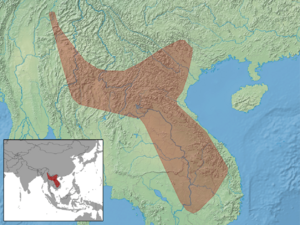Titania's woolly bat facts for kids
Titania's woolly bat (Kerivoula titania) is a small bat that lives in Southeast Asia. It's known for its unique appearance and how it gets its name.
Quick facts for kids Titania's woolly bat |
|
|---|---|
| Conservation status | |
| Scientific classification |
|
| Kingdom: | Animalia |
| Phylum: | Chordata |
| Class: | Mammalia |
| Order: | Chiroptera |
| Family: | Vespertilionidae |
| Genus: | Kerivoula |
| Species: |
K. titania
|
| Binomial name | |
| Kerivoula titania Bates, Struebig, Hayes, Furey, Mya Mya, Thong, Tien, Son, Harrison, Francis & Csorba, 2007
|
|
 |
|
| geographic distribution of Kerivoula titania | |
| Script error: The function "autoWithCaption" does not exist. | |
Script error: No such module "Check for conflicting parameters".
What's in a Name?
Scientists first officially described Titania's woolly bat as a new species in 2007. They found it in Keo Seima Wildlife Sanctuary in eastern Cambodia.
This bat looks a lot like other bats in its group, called Kerivoula bats. However, its DNA was about 12% different from other similar bats. This big difference was enough for scientists to decide it was a brand new species.
The name "titania" comes from Titania, a character in Shakespeare's play A Midsummer Night's Dream. She is the "Queen of the Fairies." The scientists who named the bat thought it was like a "nymph-like forest bat," which means it seemed delicate and magical, like a fairy.
How to Spot It
Titania's woolly bat is a medium-sized bat for its type.
- Its forearm (the part of its wing) is about 32.4–35.9 mm (1.28–1.41 in) long.
- It has large ears that are mostly hairless. These ears are about 12.8–15 mm (0.50–0.59 in) long.
- Inside its ears, it has tall, narrow parts called tragi, which are about 8.5–9.1 mm (0.33–0.36 in) long.
- Its tail is quite long, measuring about 45.8–53 mm (1.80–2.09 in).
- It's very light, weighing only about 4.0–7.9 g (0.14–0.28 oz).
- Its skull (head bone) looks noticeably flat.
- It has 38 teeth in total.
- Each of its hairs has three colors: black at the bottom, pale gray in the middle, and dark gray at the tip.
Life and Habits
Titania's woolly bat is nocturnal, meaning it is active at night. During the day, it rests or "roosts" in safe, hidden places.
Because its skull is flat, scientists think it might roost in tight spots. These could be under tree bark or in small cracks and crevices.
Not much is known about its reproduction. However, scientists once found a female bat that was almost ready to have a baby in early May. Other females were seen feeding their young in mid-May and early June.
Scientists have also found that these bats can carry certain types of viruses. This helps researchers understand how viruses spread in nature. In one study in Taiwan, about 10% of the bats tested were found to carry a specific virus.
Where It Lives
This bat was first found in eastern Cambodia. Later, scientists found more of them in Vietnam, Myanmar, Laos, and Thailand.
In 2012, it was also discovered on Hainan Island in China and in Taiwan. This was a big discovery because it was only the third type of Kerivoula bat ever found in China.
Looking After Them
The IUCN (International Union for Conservation of Nature) has assessed Titania's woolly bat as a species of "least concern." This is the lowest level of worry for a species.
It has this status for a few reasons:
- It lives in a very wide area.
- Scientists haven't found any major threats that are hurting this bat species.
- Its population doesn't seem to be decreasing quickly.
 | Shirley Ann Jackson |
 | Garett Morgan |
 | J. Ernest Wilkins Jr. |
 | Elijah McCoy |


